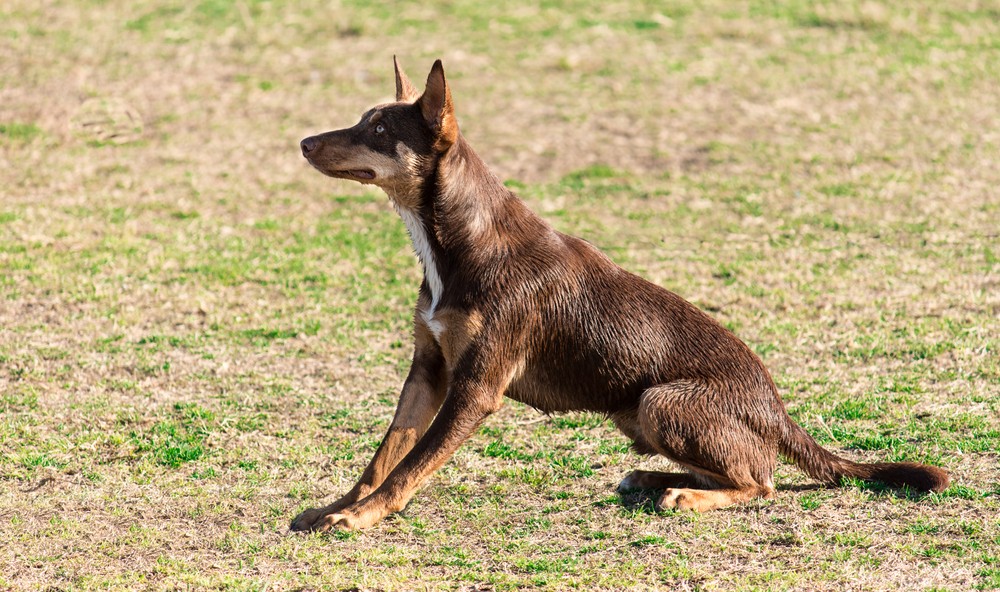Are Kelpie Dogs Good Pets? Absolutely. These intelligent, energetic, and loyal companions can be wonderful additions to the right household. At PETS.EDU.VN, we understand the importance of finding the perfect canine match for your lifestyle. Delve into this comprehensive guide to discover if a Kelpie is the ideal dog breed for you, exploring their breed traits, training advice, and Kelpie care guidelines, ensuring you’re ready to offer a loving home.
1. Understanding the Australian Kelpie Breed
The Australian Kelpie is a medium-sized herding dog originating from Australia. They were developed to work livestock in the harsh Australian outback and are known for their incredible stamina, intelligence, and loyalty. Their historical context has shaped their contemporary traits.
1.1 Breed Overview
| Attribute | Description |
|---|---|
| Height | 17–20 inches (43–51 cm) |
| Weight | 35–50 pounds (16–23 kg) |
| Lifespan | 10–13 years |
| Colors | Black, black and tan, red and tan, fawn, red, chocolate, blue |
| Suitability | Active individuals, experienced dog owners, farms, working environments, families with older children |
| Temperament | Intelligent, loyal, energetic, protective, eager to please |
| Key Traits | Exceptional herding skills, high energy, strong work ethic, loyal to owners, strong bonds with family, eager to please. |



1.2 Kelpie History and Purpose
Kelpies are descendants of British herding dogs, primarily Collies, brought to Australia in the 19th century. They were specifically bred for their ability to herd sheep independently over vast distances. Their name likely comes from a mythical Scottish water spirit, reflecting their tireless energy and seemingly supernatural herding abilities. This working background explains their modern traits.
1.3 Kelpie Appearance and Physical Characteristics
Kelpies possess a well-muscled, athletic build. Their coat is typically short and dense, providing protection from the elements. Common colors include black, tan, red, chocolate, and blue. Their keen, intelligent eyes and alert expression reflect their active minds.
2. Is a Kelpie Right for You? Temperament and Personality
Before bringing a Kelpie into your life, it’s vital to understand their temperament and personality.
2.1 Energy Levels and Exercise Needs
Kelpies are high-energy dogs that require significant daily exercise. A bored Kelpie can become destructive and develop behavioral issues. They thrive on having a job to do, whether it’s herding livestock, participating in dog sports, or simply going for long runs. Aim for at least 1-2 hours of vigorous activity each day, incorporating a variety of activities to stimulate both their mind and body.
2.2 Intelligence and Trainability
Kelpies are exceptionally intelligent and eager to please, making them highly trainable. However, their intelligence also means they require consistent training and mental stimulation to prevent boredom. Positive reinforcement techniques work best with Kelpies. This is where consistent training and stimulation come into play.
2.3 Loyalty and Protective Instincts
Kelpies form strong bonds with their families and are fiercely loyal. They can also be protective, making them excellent watchdogs. Early socialization is crucial to ensure they are comfortable around strangers and other animals. PETS.EDU.VN emphasizes the importance of early and consistent exposure to various environments, people, and other animals.
2.4 Kelpies and Children
Kelpies can be good with children, especially if they are raised together. However, their strong herding instincts may lead them to try and herd children, which can be problematic. Supervision and training are essential to teach them appropriate behavior around kids. PETS.EDU.VN recommends teaching children how to interact respectfully with dogs to ensure a safe and harmonious relationship.
3. Living with an Australian Kelpie: Practical Considerations
Owning a Kelpie involves understanding their specific needs and making adjustments to your lifestyle.
3.1 Housing Requirements
Kelpies are best suited to homes with large, securely fenced yards where they can run and play. They are not ideal apartment dogs unless their exercise needs are met through daily runs and activities. PETS.EDU.VN advises potential Kelpie owners to assess their living situation honestly before bringing a Kelpie home.
3.2 Grooming Needs
Kelpies have a relatively low-maintenance coat that requires weekly brushing to remove loose hair. They shed moderately, with heavier shedding periods in the spring and fall. Regular nail trimming and ear cleaning are also essential.
3.3 Diet and Nutrition
Kelpies need a high-quality dog food formulated for active breeds. The amount of food they require will depend on their age, activity level, and metabolism. Talk with your veterinarian to determine the best diet for your Kelpie. Remember that proper nutrition ensures a healthy, energetic life.
3.4 Health Concerns
While Kelpies are generally healthy dogs, they are prone to certain health conditions. Being aware of these potential issues can help you provide the best care for your Kelpie.
Common Kelpie Health Issues:
| Condition | Description |
|---|---|
| Hip Dysplasia | A condition where the hip joint doesn’t develop properly, leading to pain and arthritis. |
| Collie Eye Anomaly (CEA) | A genetic eye disease that can cause vision problems or blindness. |
| Progressive Retinal Atrophy (PRA) | Another genetic eye disease that causes progressive vision loss. |
| Luxating Patella | A condition where the kneecap slips out of place. |
| Cerebellar Abiotrophy | A neurological condition that affects coordination and balance. |
Preventative Care for Kelpies:
- Regular Veterinary Checkups: Annual checkups can help detect health problems early.
- Genetic Testing: Ask your breeder about genetic testing for CEA, PRA, and other inherited conditions.
- Proper Exercise and Diet: Maintaining a healthy weight and providing appropriate exercise can reduce the risk of joint problems like hip dysplasia and luxating patella.
4. Training and Socialization for Kelpies
Proper training and socialization are crucial for Kelpies to develop into well-adjusted companions.
4.1 Early Socialization
Expose your Kelpie puppy to a wide variety of people, places, and situations from a young age. This will help them develop into a confident and well-behaved adult dog. PETS.EDU.VN stresses that early socialization is key to preventing fear and aggression later in life.
4.2 Obedience Training
Enroll your Kelpie in obedience classes as soon as possible. Kelpies are eager to please and respond well to positive reinforcement techniques such as praise, treats, and toys. Consistency is key to successful training.
4.3 Herding Training
If you have livestock, consider enrolling your Kelpie in herding training. Even if you don’t have livestock, herding training can provide a valuable outlet for their natural instincts and provide mental stimulation.
4.4 Addressing Common Behavioral Issues
Kelpies can be prone to certain behavioral issues if their needs are not met.
Common Kelpie Behavior Problems:
| Problem | Cause | Solution |
|---|---|---|
| Excessive Barking | Boredom, lack of exercise, anxiety. | Provide more exercise, mental stimulation, and address any underlying anxiety. |
| Destructive Chewing | Boredom, separation anxiety. | Provide plenty of chew toys, ensure adequate exercise, and address any separation anxiety with training or medication. |
| Herding Behavior | Natural instinct to herd, can be directed towards children or other pets. | Train your Kelpie to control their herding instincts and provide appropriate outlets for their energy. |
| Chasing | High prey drive, can lead to chasing cars, bikes, or other animals. | Train a reliable recall and keep your Kelpie on a leash in unfenced areas. |
| Digging | Boredom, seeking attention, or trying to escape. | Provide a designated digging area, ensure adequate exercise and mental stimulation, and address any underlying issues. |
Professional Help:
If you are struggling with your Kelpie’s behavior, consult a qualified dog trainer or behaviorist. They can help you identify the cause of the problem and develop a training plan to address it.
5. Finding a Kelpie: Breeders and Rescue Organizations
If you’ve decided that a Kelpie is the right dog for you, it’s important to find a responsible breeder or rescue organization.
5.1 Responsible Breeders
A responsible breeder will prioritize the health and temperament of their dogs. They will be knowledgeable about the breed, answer your questions honestly, and allow you to meet the parent dogs. Avoid breeders who seem primarily motivated by profit or who are unwilling to provide health clearances for their dogs.
5.2 Kelpie Rescue Organizations
Consider adopting a Kelpie from a rescue organization. There are many Kelpies in need of loving homes. Rescue organizations can provide valuable information about the dog’s temperament and history.
5.3 Questions to Ask Breeders and Rescue Organizations
When contacting breeders or rescue organizations, ask the following questions:
- What is the dog’s temperament like?
- What is the dog’s history?
- Has the dog had any health problems?
- Have the parents been health tested?
- Can I meet the parents?
- What is the adoption process?
6. Kelpies in Different Lifestyles: Are They a Good Fit?
Kelpies can thrive in various lifestyles if their needs are met.
6.1 Kelpies as Working Dogs
Kelpies excel as working dogs and are still widely used on farms and ranches. Their intelligence, stamina, and herding skills make them invaluable partners for farmers and ranchers.
6.2 Kelpies in Dog Sports
Kelpies excel in dog sports such as agility, flyball, and disc dog. These activities provide a great outlet for their energy and intelligence.
6.3 Kelpies as Companion Animals
Kelpies can be wonderful companion animals for active individuals and families. However, it’s important to remember that they require significant exercise and mental stimulation.
7. Alternative Dog Breeds to Consider
If you’re not sure if a Kelpie is the right dog for you, consider these alternative breeds:
Similar Breeds to the Australian Kelpie:
| Breed | Description | Key Differences from Kelpie |
|---|---|---|
| Border Collie | Highly intelligent and energetic herding dog. | Generally more intense and focused than Kelpies, require more experienced handlers. |
| Australian Shepherd | Intelligent and versatile working dog. | Tend to be slightly larger and more prone to certain health issues than Kelpies. |
| Belgian Malinois | Intelligent and highly trainable working dog, often used in law enforcement and military. | More intense and demanding than Kelpies, require very experienced handlers. |
| German Shepherd | Intelligent and loyal working dog, commonly used as a family pet and guard dog. | Larger and heavier than Kelpies, prone to different health issues. |
| Cattle Dog | Energetic and intelligent herding dog, known for their loyalty and protective nature. | More independent and less eager to please than Kelpies, require firm and consistent training. |
8. Kelpie FAQs: Addressing Common Concerns
Here are some frequently asked questions about Kelpies:
-
Are Kelpies good with cats?
It depends on the individual dog and their early socialization. Some Kelpies can live peacefully with cats, while others may chase them due to their herding instincts.
-
Do Kelpies bark a lot?
Kelpies can be prone to barking if they are bored or anxious. Providing adequate exercise and mental stimulation can help reduce barking.
-
Are Kelpies easy to housetrain?
Kelpies are generally easy to housetrain due to their intelligence and eagerness to please. Consistency and positive reinforcement are key.
-
How much do Kelpies cost?
The cost of a Kelpie puppy can vary depending on the breeder, location, and pedigree. Expect to pay between $800 and $2500 for a well-bred Kelpie puppy.
-
Do Kelpies need a lot of space?
Kelpies are active dogs that need plenty of space to run and play. They are best suited to homes with large, securely fenced yards.
-
Are Kelpies good for first-time dog owners?
Kelpies can be challenging for first-time dog owners due to their high energy and intelligence. They require consistent training and socialization.
-
What is the best way to exercise a Kelpie?
The best way to exercise a Kelpie is through a combination of physical and mental activities. This can include running, playing fetch, agility training, and herding.
-
Are Kelpies prone to separation anxiety?
Kelpies can be prone to separation anxiety if they are left alone for long periods. Providing plenty of exercise and mental stimulation can help prevent separation anxiety.
-
How long do Kelpies live?
The average lifespan of a Kelpie is 10-13 years.
-
What are the most common health problems in Kelpies?
Common health problems in Kelpies include hip dysplasia, Collie eye anomaly, progressive retinal atrophy, and luxating patella.
9. The Joys and Challenges of Owning a Kelpie
Owning a Kelpie can be a rewarding experience, but it’s important to be aware of the challenges involved.
The Joys of Kelpie Ownership:
- Unwavering loyalty and affection
- Intelligent and eager to please
- High energy and enthusiasm for life
- Versatile and capable of excelling in various activities
- Excellent watchdog
The Challenges of Kelpie Ownership:
- High energy and exercise needs
- Potential for behavioral issues if not properly trained and socialized
- Strong herding instincts can be problematic in some situations
- Prone to certain health problems
10. Conclusion: Making an Informed Decision about Kelpie Ownership
Are Kelpie dogs good pets? Kelpies can be wonderful companions for the right owners. They are intelligent, loyal, and energetic dogs who thrive on having a job to do. However, they are not the right breed for everyone. They require significant exercise and mental stimulation, and they can be prone to behavioral issues if their needs are not met.
Before bringing a Kelpie into your life, carefully consider your lifestyle and whether you can provide the time, energy, and resources needed to care for this demanding breed. If you can, you’ll be rewarded with a loyal and loving companion who will bring joy to your life for many years to come.
At PETS.EDU.VN, we’re committed to providing you with the information you need to make informed decisions about pet ownership. If you’re considering adding a Kelpie to your family, we encourage you to explore our website for more resources and advice. Visit us at 789 Paw Lane, Petville, CA 91234, United States or contact us via Whatsapp at +1 555-987-6543. You can also find more information on our website, pets.edu.vn. We’re here to help you every step of the way!